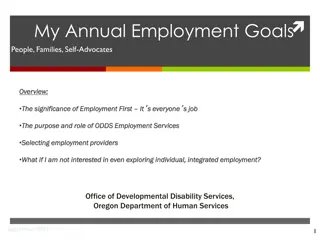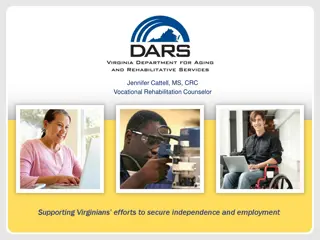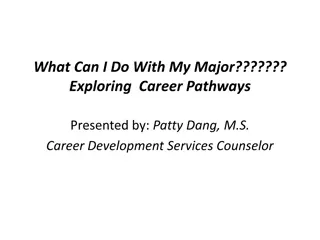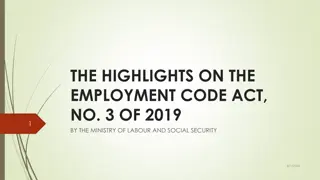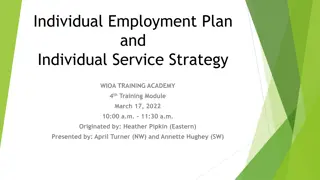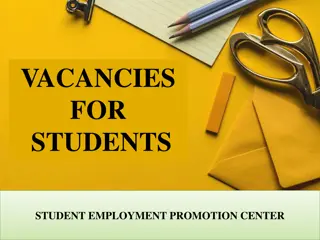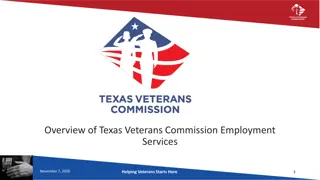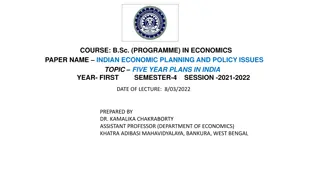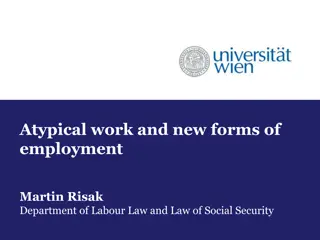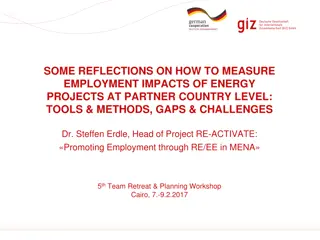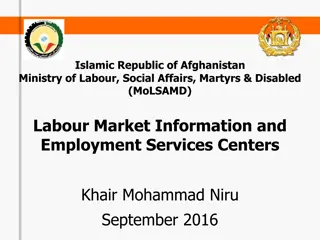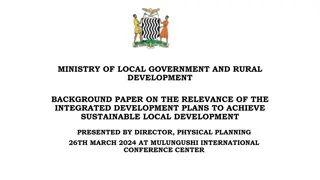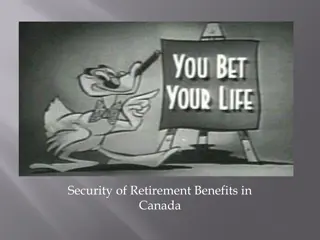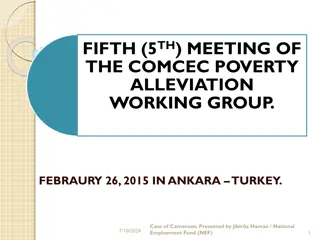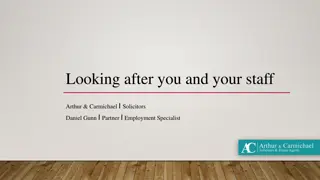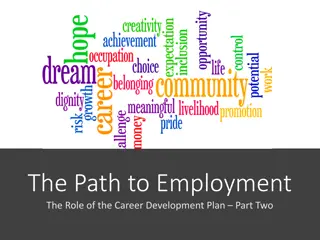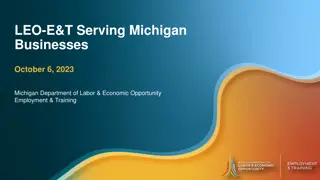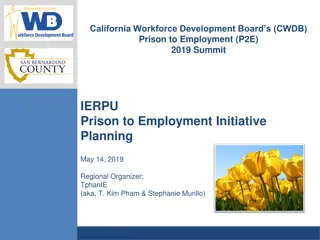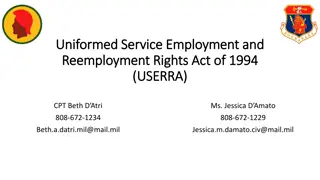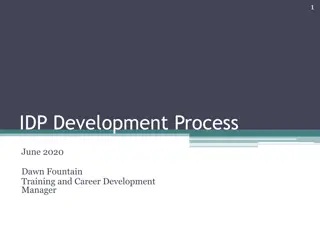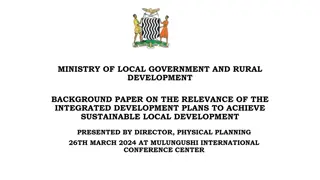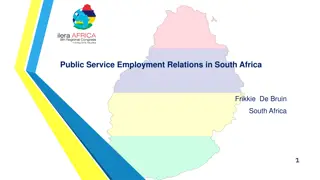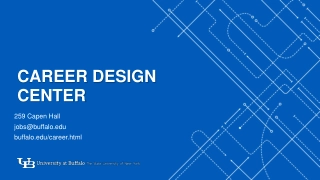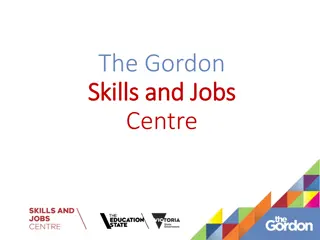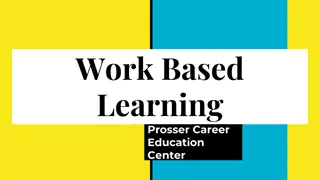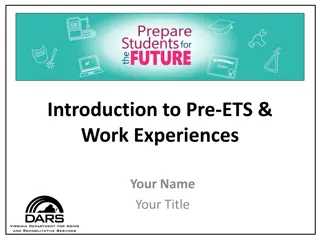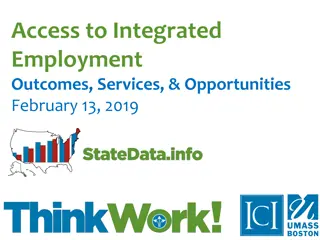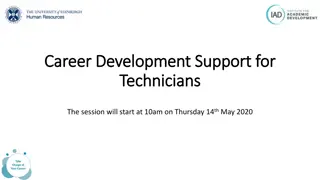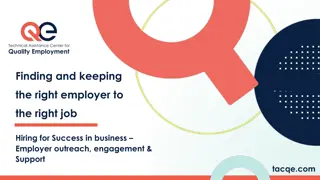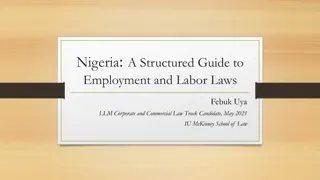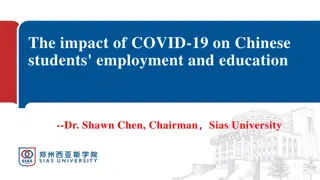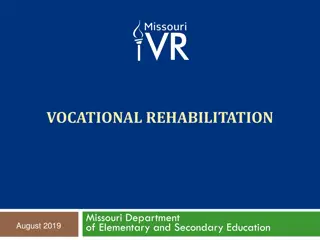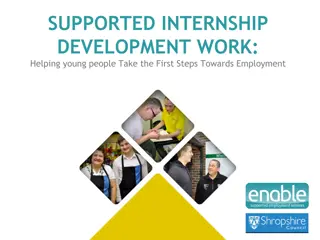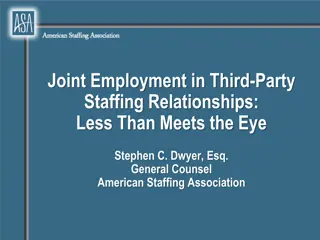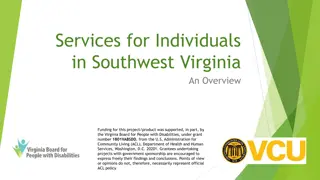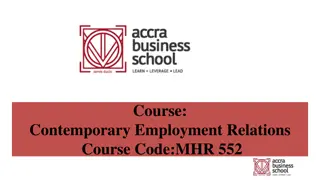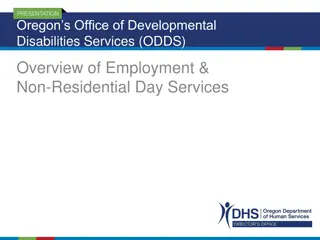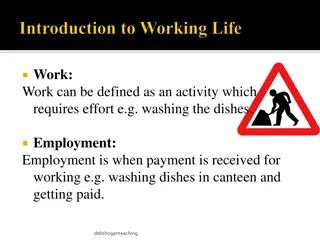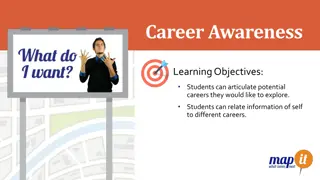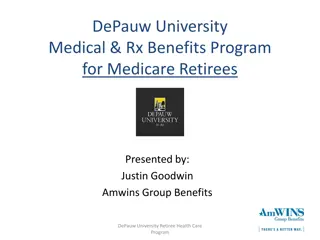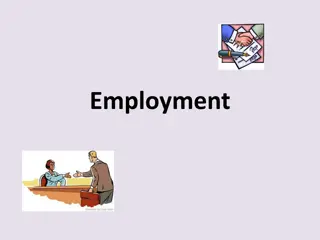Exploring the Benefits of Employment and Career Development Plans
Dive into the world of employment through the lens of career development plans with a focus on empowering individuals with disabilities to overcome challenges, seek assistance, and discover their strengths in the workplace. Learn how work can be a source of hope, self-acceptance, and personal growth, emphasizing the importance of inclusive and supported employment environments.
Download Presentation

Please find below an Image/Link to download the presentation.
The content on the website is provided AS IS for your information and personal use only. It may not be sold, licensed, or shared on other websites without obtaining consent from the author. Download presentation by click this link. If you encounter any issues during the download, it is possible that the publisher has removed the file from their server.
E N D
Presentation Transcript
The Path to Employment The Role of the Career Development Plan Part One
Often, the rites of childhood running, riding a bike, reading, writing, etc. . . .can be very frustrating to children with disabilities. . . . First Impressions Can Limit 2
Pretty soon, you can begin to think you re not good at anything . . .so why even try . . . First Impressions Can Limit 3
Work is an opportunity to focus on what you are good at what you shine at instead of focusing on getting better at what you struggle at. . . It can be the window to hope . . . you discover that there are things you shine at and that you have so much to contribute. The Power of Work 4
The Power of Work is to be a Part of not Apart from A literature review found that one of the benefits of work was being accepted. ~ Ellenkamp, 2016 5
Griffin et al. (1996) found higher levels of self esteem as well as job satisfaction for those in supported employment than for those in sheltered employment. Why Competitive Integrated Employment? ~ Akkerman, 2016 6
Can work with the right supports Employment First Presumes People: Want to work Have Talents and Gifts 7
If you are having a tough time imagining that someone will succeed at work ask for help it shows strength not weakness to seek the expertise and imagination of others . . . our lack of imagination must never be the reason someone does not succeed. It s Always Okay to Ask for Help By reaching out for insight, you are providing an invaluable service to the person . . . 8
A rich opportunity to find out what you are good at Being part of a team Employment is: Feeling like everyone else Structure A place to be every day with things to accomplish every day Learning and tackling new challenges 9
The Opportunity to Make Money Employment is: Money gives us more control over our life because we have more options 10
Tap other peoples expertise and insight Because Employment is Everyone s Job Residential staff have an immense amount to contribute 11
Employment success depends upon everyone who is a paid or natural support including people who support the person at home. It is critical that everyone understands their roles in supporting the person in matters such as: Employment is Everyone s Job being to work on time, adhering to the employer s dress code, scheduling recreational activities so they do not conflict with the person s work schedule, etc. In Oregon, an Employment First state, employment is everyone s job. 12
The Path to Employment is: Easier when a person knows they want to work More challenging if the person: Has only done work that he/she did not like and/or was not good at Is not sure about employment Does not think they will succeed 13
Optimally, decisions are made based on experiences performing and/or observing work that they are interested in because: Where to Start? Exposure precedes interest. - Tennessee Employment First Consortium, 2010 14
A conversation grounded in the premise that the person can and does want to work Where to Start if the Person Has Not Experienced Competitive, Integrated Employment 15
Stories are the best tool If you need some, click here: Tools for the Conversation https://www.oregon.gov/DHS/EMPLOYMENT/EMPLOYMENT-FIRST/SUCCESS-STORIES/Pages/index.aspx https://www.oregon.gov/DHS/EM PLOYMENT/EMPLOYMENT- FIRST/SUCCESS- STORIES/Pages/index.aspx https://www.oregon.gov/DHS/EMPLOYMENT/EMPLOYMENT-FIRST/SUCCESS-STORIES/Pages/index.aspx https://www.oregon.gov/DHS/EMPLOYMENT/EMPLOYMENT-FIRST/SUCCESS-STORIES/Pages/index.aspx https://www.oregon.gov/DHS/EMPLOYMENT/EMPLOYMENT-FIRST/SUCCESS-STORIES/Pages/index.aspx 16
Connect work and money to things and/or experiences the person likes. What if the Person Does Not Understand the Concept of Work and/or Money? 17
Listen and talk it through so you both can consider what worked and what did not work. What if the Person Has Had a Bad Experience Working in the Community? 18
Presume supporters have good intent. When Supporters are Concerned Remember, if the supporter can halt the process, they can also accelerate it . . . ~ Slide is courtesy of Don Galligan, Personal Agent, Eastern Oregon Support Services Brokerage Starting slowly toward is better than not starting at all. 19
1. They are not eligible for waiver- funded employment services; and In Oregon, When a Person Decides not to Even Explore Community Employment: 2. The ISP must show how the person made an INFORMED decision. A person can change their mind about working at any time 20
The purpose of waiver-funded employment services is help a person to explore, secure, maintain and/or advance in Competitive, Integrated Employment (CIE). Employment Services: An employment service is not an end in and of itself 21
Work is a fundamental part of adult life for people with and without disabilities. It provides a sense of purpose, shaping who we are and how we fit into our community. Meaningful work has also been associated with positive physical and mental health benefits and is a part of building a healthy lifestyle as a contributing member of society. CMS Bulletin, 9/16/11: 22
How the person s life will be different because of the time they invested in the service An Outcome is: 23
Statements that focus on improving tasks done at the sheltered workshop: What is NOT an Employment Outcome? John will improve his productivity at bagging nails by 15% in the next six months on the workshop s Smith Hardware contract. 24
. . . Having career adaptability, or considering oneself able to construct own future career intentions and to cope with career transitions and difficult work situations, may favor also individual with intellectual disability positive feelings to face difficulties and to succeed in what it is important for them (Scioli et al., 2011), thus stimulating even greater feelings of life satisfaction. ~ Santilli, 2016 Why Work? 2 5
Having a regular job offers a range of benefits for example conveying status and purpose to an individual s existence, promoting participation and social interaction with others in society. It is also an opportunity for financial autonomy and a social determinant of health in that it promotes quality of life, better health, and a greater sense of control over one s life. In addition, work allows [people] to learn new skills . . . Why Work? Ellenkamp, 2015 26
Akkerman, A., Janssen, C. G., Kef, S., & Meininger, H. P. (2016). Job satisfaction of people with intellectual disabilities in integrated and sheltered employment: an exploration of the literature. Journal of Policy and Practice in Intellectual Disabilities, 13(3), 205-216. Ellenkamp, J.J.H., Brouwers, E.P.M., Embregts, P.J.C.M. et al. Journal of Occupational Rehabilitation (2016) 26: 56. Work environment-related factors in obtaining and maintaining work in a competitive employment setting for employees with intellectual disabilities: a systematic review https://doi.org/10.1007/s10926-015-9586-1 References https://doi.org/10.1007/s10926-015-9586-1 Santilli, Sara & Rochat, Sh kina & Marcionetti, Jenny & Rossier, J r me. (2016). Career Adaptability, Hope, Optimism, and Life Satisfaction in Italian and Swiss Adolescents. Journal of Career Development. 44. 10.1177/0894845316633793. 27
Julie Huber Office of Developmental Disability Services Thank You State of Oregon julie.l.huber@state.or.us julie.l.huber@state.or.us 28


